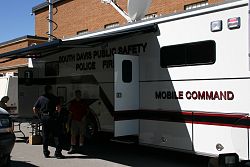Crisis respondent says resiliency is a key to healing

BOUNTIFUL – "Resiliency is a key to healing when faced with a disaster," said Kevin Broderick, is a licensed marriage and family therapist for the Latter-day Saints Family Services Crisis Response Team. Broderick spoke to the community at Bountiful High School at one of several American Red Cross Preparedness Fairs offered throughout Utah Sept. 13. Broderick has responded to victims of the 2009 earthquakes in Haiti and Chile, to family members of the deceased victims of the Crandall Canyon Mine and the three rescue workers who were killed by a subsequent collapse 10 days later in Emery County and to victims of Hurricane Katrina in New Orleans in 2005. "Our focus is mental, emotional, spiritual and physical support," said Broderick. "We all have issues and difficulties, but building a capacity to tolerate and manage emotions, cope flexibly with life challenges and bereavement will help you face trials in the future," he said. "Also helpful is having a camper or mobile home in which you can stay for 72 hours to a week and family support to help you cope with a disaster. You can also train yourself to be more resilient by getting into the habit of building mental, relational, emotional, physical and spiritual strength." Broderick gave the example of Rick Rescorla, a security guard at the Twin Towers, who realized he needed to take more responsibility and not rely on first responders to save his employees after the first terrorist attack occurred in 1993 when a truck exploded in the garage. He taught his employees to be responsible by running them through frequent surprise fire drills. He noted the best way to perform under extreme stress was to repeatedly run through rehearsals before a disaster. On the morning of 9/11 and the terrorist attack, he heard the explosion in the first twin tower. The authorities warned them to stay where they were, but Rescorla disobeyed and evacuated 2,687 people to safety through the stairwell. When they were half way down the stairwell, a plane hit the second twin tower where they would have been. Rescorla went back inside the tower and his remains were never found. "What was learned from Rescorla is that anticipation, preparation and self-reliance can prepare you for the unexpected," said Broderick. People rush in to help rescue after a disaster and offer a lot of support. Then the funerals, or clean-up is completed, the respondents leave and the victims are left with a life that is different. "That is when the symptoms of grief, anger, sadness, rage, stress, discouragement, fatigue and blame occur," said Broderick. "When you go through a disaster talk about the crisis, cry your tears, allow your emotions to work through your body, use humor and know you are going to experience a new normal. Two things that are critical in a crisis are having a spiritual connection with God and the ability to share your situation with a support group. If you have a spiritual foundation on which you can assign meaning to the losses, you will be in a much better place to heal. Don’t sit in the disaster, have a mental health break with activities and resume attending church."
© Copyright 2025 The Diocese of Salt Lake City. All rights reserved.

Stay Connected With Us